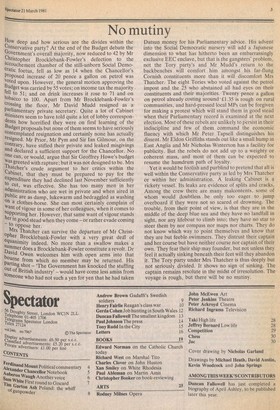No mutiny
HOW deep and how serious are the divides within the Conservative party? At the end of the Budget debate the Government's overall majority, now reduced to 42 by Mr Christopher Brocklebank-Fowler's defection to the aecouchement chamber of the still-unborn Social Democratic foetus, fell as low as 14 when the Chancellor's Proposed increase of 20 pence a gallon on petrol was voted upon. However, the general motion approving the Budget was carried by 55 votes; on income tax the majority fell to 51; and on drink increases it rose to 71 and on tobacco to 100. Apart from Mr Brocklebank-Fowler's crossing the floor, Mr David Mudd resigned as a Parliamentary, private secretary. Quite a lot of Cabinet ministers seem to have told quite a lot of lobby correspond,eins how horrified they were on first learning of the budget proposals but none of them seems to have seriously contemplated resignation and certainly none has actually resigned. Mr Prior, Mr Pym and Sir Ian Gilmour, on the Contrary, have stifled their private and leaked misgivings and declared a sufficient support for the Chancellor. No One can, or would, argue that Sir Geoffrey Howe's budget Was greeted with rapture; but it was not designed to be. Mrs Thatcher's crude argument to her critics within the Cabinet, that they • must be prepared to pay for the expenditure they had declined last November sufficiently to cut, was effective. She has too many men in her administration who are wet in private and when aired in Public are as damp, lukewarm and bedraggled as washing °n a clothes-horse. She can most certainly complain of want of vigour in some of her colleagues, when it comes to suPporting her. However, that same want of vigour stands her in good stead when they come or rather evade coming to oppose her.
mrs Thatcher can survive the departure of Mr ChristoPher. Brocklebank-Fowler with a very great deal of equanimity indeed. No more than a swallow makes a !Ummer does a Brocklebank-Fowler constitute a revolt. Dr pavid Owen welcomes him with open arms into that bourne from which no member may be returned. His Parting shot — 'The Government has knocked the stuffing cnn of British industry' — would have come less amiss from someone who had not such a yen for yen that he had taken Datsun money for his Parliamentary advice. His advent into the Social Democratic nursery will add a Japanese dimension to what has hitherto been an embarrassingly exclusive EEC enclave, but that is the gangsters' problem, not the Tory party's and Mr Mudd's return to the backbenches will comfort him amongst his far-flung Cornish constituents more than it will discomfort Mrs Thatcher. The eight Tories who voted against the petrol impost and the 25 who abstained all had eyes on their constituents and their majorities. Twenty pence a gallon on petrol already costing around .35 is rough on rural communities, and hard-pressed local MPs can be forgiven for making a protest which will stand them in good stead when their Parliamentary record is examined at the next election. Most of these rebels are unlikely to persist in their indiscipline and few of them command the economic fluency with which Mr Peter Tapsell distinguishes his dissent. Mr Eldon Griffiths stands out like a small hump in East Anglia and Mr Nicholas Winterton has a facility for publicity. But the rebels do not add up to a weighty or coherent mass, and most of them can be expected to resume the humdrum path of loyalty.
Yet it would be foolish and purblind to pretend that all is well within the Conservative party as led by Mrs Thatcher or within her administration. A leaking Cabinet is a rickety vessel. Its leaks are evidence of splits and cracks. Among the crew there are many malcontents, some of whom would doubtless be only too eager to jump overboard if they were not so scared of drowning. The trouble, from their point of view, is that they are in the middle of the deep blue sea and they have no landfall in sight, nor any lifeboat to climb into; they have no star to steer them by nor compass nor maps nor charts. They do not know which way to point themselves and know that they are but feeble swimmers. They distrust their captain and her 6ourse but have neither course nor captain of their own. They fear their ship may founder, but not unless they feel it actually sinking beneath their feet will they abandon it. The Tory party under Mrs Thatcher is thus deeply but not seriously divided. It shows no sign of sinking. The captain remains resolute in the midst of irresolution. The voyage is rough, but there will be no mutiny.






































 Previous page
Previous page